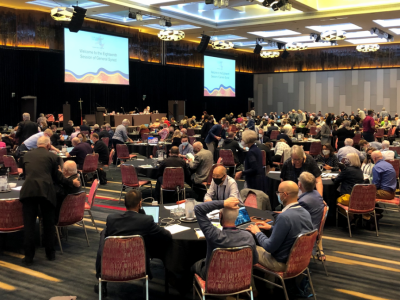General Synod votes on Climate Change
June 3rd, 2022

At General Synod in May this year, the gathered representatives of the Anglican Church of Australia met to consider, amongst other things a key motion on environmental action in light of the climate change crisis.
The motion, brought by Brisbane Dean, the Very Revd Dr Peter Catt (extracted below) gained overwhelming support calling on the church to take action to address greenhouse gas emissions and to lobby governments to set greater emissions reduction policies.
Our own representative and Registrar, Richard Connelly spoke to the motion.
Climate Change motions are expected to be discussed at Gippsland’s own Synod scheduled for 17-19 June in Sale.
16.11 Climate Change Call on Australian Governments The Very Revd Dr Peter Catt moving and Bishop Murray Harvey seconding Noting: A. Agreement (COP21) and in particular the global framework to avoid dangerous climate change caused by emissions of greenhouse gases by limiting global warming to well below 2°C and pursuing efforts to limit it to 1.5°C. B. achieve nett zero emissions by 2050, and the endorsement of this pledge by both the Coalition government at the time of the Conference and the Australian Labour Party then in Opposition. C. That all Australian sub-national governments have also endorsed the goal of nett zero emissions by 2050 or earlier. D. That all levels of Australian government apart from WA and NT have committed to interim reductions by 2030. E. That urgent action to keep the 1.5C goal alive was called for at COP26 with 190 countries pledging to rapidly phase down their use of coal a pledge that was not adopted by Australia. F. That while Australian greenhouse gas emissions in the electricity generation sector are declining, in all other sectors including transport, agriculture and resource extraction emissions continue to increase consistent with a 3C warming scenario if other countries followed similar policies and emissions trajectories.
This Synod
- understands the theological value of the natural world as a divine blessing intended by God to flourish and to be shared in harmony by human communities, and recognises that this blessing has been spoiled and abused by human greed and carelessness; • laments the suffering already being endured across the world by communities facing drought, water insufficiency, loss of arable lands, destructive fire events, cyclones, floods and rising sea levels, and the increasing threat to life caused by rising global temperatures, air pollution and loss of biodiversity which will be borne disproportionately by the poorest of the world • is appalled at the lack of action by governments and powerful corporations who pay lip-service to the need for climate action but do not take the urgent and far-reaching actions consistent with avoiding climate catastrophe and immense suffering; • is ashamed of the low ambition for climate action shown by government, major institutions and businesses in Australia, and resolves to hold major stakeholders to account; • calls upon the Federal government to explain how its stated support for the 1.5C warming goal can be consistent with its refusal to adopt the COP26 pledge to phase down the use of coal; • calls on all levels of Australian government to significantly lift interim 2030 emissions targets in recognition that action must be taken this decade to avoid breaching the 1.5C warming target; • calls upon the Federal and each of the sub-national governments to advise what policies it has implemented or plans to implement in order to achieve both the net zero by 2050 goal and the keeping of global warming below 1.5C; • demands that Australian governments enact legislation to ensure businesses profiting from our shared environment are made accountable and financially responsible for the true cost of environmental degradation including climate change mitigation and adaptation; • encourages all levels of Australian government to think beyond the next budget cycle, to commit the level of resources consistent with the scale of the problem, to equip and encourage Australian institutions, media organisations, businesses and places of learning in order that we can work together to develop imaginative and creative responses to climate catastrophe.
 Gippsland Anglicans
Gippsland Anglicans